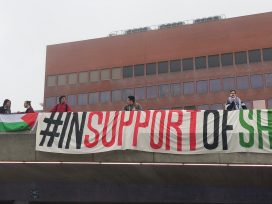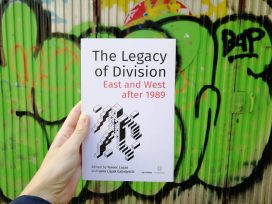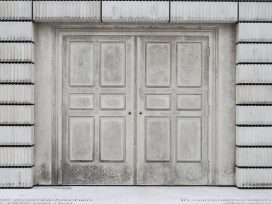“We asked for freedom and you gave us the market,” said the Czech writer Ivan Klima wryly in the first decade of liberalization in the countries of central and eastern Europe (CEE). Now, on the twentieth anniversary of the fall of the Berlin Wall, many of the correspondents in the present dossier on the post-communist media echo his cry. What might have been seen as teething troubles have become endemic problems. Anniversaries are arbitrary moments and this one is no exception: not so much a coming of age as a time for evaluation and assessment. Above all for questions: Was it right to transplant the Euro-US media model into an alien environment? Could the resources devoted by western governments and media organizations to training – an estimated US$1.4 billion annually – have been better spent or, as Veran Matic, founder of the Serbian broadcaster B92 puts it – “better tailored to local needs and circumstances”? How could the social function of journalism in a new democracy have been reconciled with the exigencies of the market? Were expectations on both sides unrealistic?
The natural wealth of expectation that accompanied the fall of the Wall was characterized on one side by near total lack of experience of what “democracy”, “freedom” and the “market” really involved; on the other by a strange amnesia – in much of western Europe, democracy was of relatively recent date yet the chaos and difficulties of that transition seemed forgotten. For the West, democratic pieties aside, this was all about markets. For the media conglomerates staggering under the impact of globalization and the threat of new technology, with further expansion on home ground inhibited by anti-monopoly legislation, this was what they had been waiting for. East of West, the expectation was of freedom in all its manifestations; in reality, the few were quick to turn the new economic freedoms to their advantage, while the political freedoms of the many often remained hypothetical. The conflict was there from the beginning; the shock of recognition followed.
Undoubtedly the market brought money and investment into the region, but this was narrowly channelled and brought little benefit to the mass of the population. Corruption reaches from the top down into the crevices of bureaucracy and society. The assets of the communist state largely passed at best to reformist communists, at worst into the hands of unregenerate old party members; the oligarchs of the new dispensation were born and the mafia reared its head. Except where foreign capital exercised control, the methods of the past dominated the management of the new. Lustrations other than at the political level were sporadic and half-hearted: the old mentalities passed into the new. On the intellectual front it was little different. There was no Marshall Plan of the mind and the old intellectuals, now ideologues without an ideology and with no concept of transforming themselves into market commodities, positioned themselves under the patronage of the old nomenclatura, itself competing for democratically acquired supremacy. What passed for public debate, formerly the preserve of the intelligentsia, was merely the bickering and propaganda of competing parties; dialogue with the people, except to solicit their vote, was non-existent.
So where did that leave the media, just one more market commodity among many? Fired by the understanding that freedom of expression was a fundamental democratic concept, the mass media of the time – press, radio and television – were quick to join the process of transformation that in most countries began in 1989. The press was deregulated and privatized. Literally hundreds of independent publications were created, only to fail almost as rapidly as the money ran out. The quality press began to lose out in the advertising battle as the majority went down the tabloid road. Many tied their colours to one or other political mast; some received funding from western foundations only to fall victim to the market trap when that was withdrawn. Those who took the commitment to free expression seriously, who saw the media as the forum for public debate, the handmaiden of democracy and the conventional watchdog on political and commercial power, became targets for new forms of censorship. The conjoined commercial, media and political forces found ways of silencing them every bit as effective as the old state offices of censorship.
As the various countries dismantled their formerly state-owned broadcasting sectors, frequencies were divided between what was planned as a new public service broadcaster and commercial channels. There was no experience of the dual system familiar in the West and, as the OSCE Representative on Freedom of the Media Miklos Haraszti
remarks colourfully, the public sector was more or less strangled at birth by lack of funding and quickly became the poor relation of the commercial stations. In most countries, PSB ratings dropped from 100 per cent to less than 20 per cent at best and so did revenues. The competition for advertising saw it depart even further from its public service remit as it persisted in the unequal struggle.
In the immediate aftermath of 1989, the commercial sector fared little better. As local capital ran short, the entry of many of the major western European media corporations, dominantly German, Swiss and Austrian, into CEE was warmly welcomed. It brought huge and much needed injections of cash plus technical and professional innovation. In the absence of adequate legislation, media concentration, vertical and horizontal, proliferated to the point of saturation in some countries. As some of the incoming corporations extended ownership into more than one country, cross border concentration also became an issue.
But while it brought greater professional skills, the foreign-owned media did not, to the disappointment of those who continued to hold out against the diverse pressures on the domestic media, do much to raise the status of journalists or confront the engrained habits of locally-owned outlets. Twenty years on, the net benefits of foreign media ownership on this scale are disputed: while media organizations and monitoring groups outside the region warn of the dangers of this level of foreign ownership, journalists and others in the region are more inclined to agree with Haraszti’s view that it was a welcome antidote to the claustrophobic world of the domestic media in which they are constantly at the mercy of political and economic pressure.
As the old state media assets were sold off, local media oligarchs were born and any separation of powers was lost in the determination by politicians to retain control by other means: the multiple roles of “bizniss”, politics and the media frequently ended up in the same hands; where the market or politics collided with attempts to build a democratic media akin to a “fourth estate” watchdog on power, the latter deferred. Civil society had yet to apprehend its role and the public arena, formerly the preserve of state-funded intellectuals, was abandoned as many of the latter joined the payroll of parties and papers, frequently one and the same thing. Politicians in many places had almost as easy a passage back into political life. After the first flush of democratic initiatives, old habits thinly buried pushed up through the thin veneer hastily laid over poor foundations. As the media commentator Peter Gross has said recently, it is not just about the recent past: “Communist and pre-communist instilled attitudes and behaviours that are also present in the post-communist era and exemplified in the nature of the media, relations within the media and between them and other societal institutions: lack of transparency in public and private institutions, including the media institutions, distrust and intolerance.” The socio-cultural supports for post-communist democratization and the media, an intimate part of the process, “are lacking or are ill developed”.
It would be rash to imply that there is a uniform picture across the region. Despite the problems the writers in this dossier – the majority of them working journalists, others teaching in the media field and one at least an important player in media policymaking – confront, the situation differs sharply from country to country. Hungary, the Czech Republic, Slovakia and Poland may have their problems, but they are not of the same order as those still encountered in much of the Balkans. The media in Serbia and Croatia are still recovering from the trauma of war in the course of which they became a nationalist propaganda tool. Huge progress has been made but as our timelines for the two countries show, it remains a rough ride. Those journalists who attempt to do their job inevitably cross swords with the authorities – and pay the price.
One of the more evident signs that all is not well is the murder and abuse of journalists. Miklos Haraszti is right when he says that governments who fail to bring the criminals to justice are complicit in the crime. Murders of journalists remain unsolved in Croatia, Serbia and Bulgaria. But while it is true to say that murder is the ultimate censorship, it is only the tip of the iceberg. As Croatian writers
Viktor Ivancic and Slavenka Draculic make all too clear, there are other ways of killing a publication or a programme. The vested and overlapping interests of politics-media-business can kill or cripple a publication or a programme just as surely as the assassin’s bullet. Corruption is part of any political system; in too much of CEE it defines the system. Nor, as Drago Hedl suggests, can the influence of organized crime in the Balkans be ignored: it is buying and selling the media much as it traffics women, children and cigarettes.
But despite these disparities, it is instructive that the questions raised in countries as different as Serbia and Hungary or the Czech Republic and Croatia have a deal of common ground. Concern centres on the role of the market, the precarious state of public service broadcasting and continuing political intervention. Is the first really the omnivorous beast implied by Jaromir Volek of the Czech Republic? Do governments have the will to find a funding formula that will rescue PSB? Should the EU play a more assertive role among its members: use its “soft” power alongside the OSCE watchdog to curb the corruption that pervades politics and commerce and makes intervention in the media endemic?
No one disputes the profound changes since 1989. A new media landscape has emerged in central and eastern Europe, largely modelled along the lines of an idealized Euro-US system. And it is against this that the present correspondents implicitly measure their achievement in their frank and sober assessment. But at a time when the media business globally is in turmoil, is this “model” still relevant? Which in turn begs the question: what other models are there? The “Mediterranean model”, with what Slovenian journalist Marjan Horvat describes as a “political parallelism and instrumentalization of the media”, is surely not the solution.
The questions and the searching will continue, but congratulations, too, are in order. Journalists and those engaged with the media in the region have displayed an extraordinary negative capability. At times, they have walked on the edge of chaos but they have not given up; the idea of a democratic media in the service of civil society has taken root and will not easily be stolen from them. It may take another 20 years to bring practice in line with aspirations, but the past is another country – though maybe not quite and not yet.






